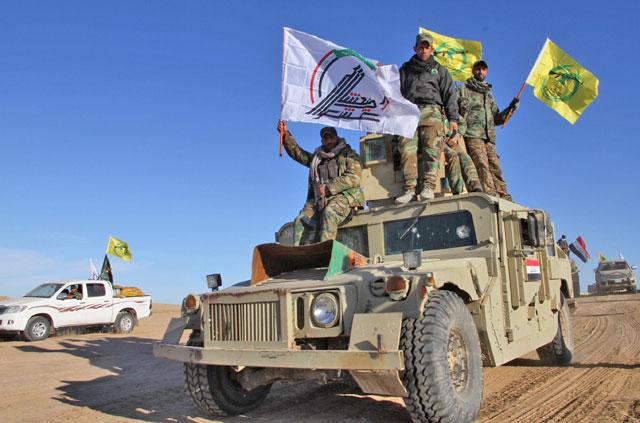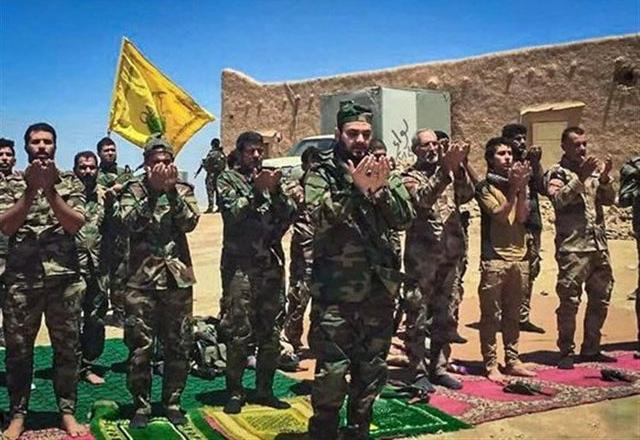You are here
Iraqi militia indicates it will hand heavy guns to army after Daesh quashed
By Reuters - Nov 23,2017 - Last updated at Nov 23,2017

Iraqi Shiite fighters of Saraya Ashura (Ashura Companies) from the Hashed Al Shaabi (Popular Mobilisation Units) wave their flags as they ride on a humvee as they advance with the Iraqi forces in the western desert in the northern Iraqi region of Al Hadar, 105 kilometres south of Mosul, on Thursday, flushing out remaining Daesh fighters in Al Jazeera region (AFP photo)
BAGHDAD — A prominent Iraqi militia indicated on Thursday it would give any heavy weapons it had to the military once the Daesh extremist group was defeated and rejected a proposed US congressional bill designating it a terrorist group.
Harakat Hizbollah Al Nujaba, which has about 10,000 fighters, is one of the most important militias in Iraq. Though made up of Iraqis, it is loyal to Iran and is helping Tehran create a supply route through Iraq to Damascus.
The Nujaba fights under the umbrella of the Popular Mobilisation Units (PMU), a mostly Iranian-backed coalition of Shiite militias that played a role in combating Daesh.
Disarming the PMU is seen as Prime Minister Haider Al Abadi's most difficult test as Iraqi forces edge closer to declaring victory over the Sunni militants.
"The heavy weapons belong to the Iraqi government, not us. We are not rebels or agents of chaos and we do not want to be a state within a state," Hashim Al Mouasawi, the group's spokesman, said at a news conference on Thursday.
He was responding to a Reuters question on whether his group would obey orders by Abadi, who as prime minister commands the military, to return heavy weaponry, reduce the number of fighters, or withdraw from Syria. He would not be drawn on the reduction of fighters or Syria.
"The PMF is under the command of the Commander-in-Chief of the Armed Forces and naturally when the war is over and victory is declared, the final decision will be his," Mouasawi said.
His comments broadly echoed those of Iraqi military spokesman Brigadier General Yahya Rasool.
"The tanks, armoured vehicles, and machineguns belong to the army and it is natural that after the battles are over they return to the army," Rasool told Reuters in an interview.
Nujaba strongly objected to moves by Washington towards designating it a terrorist group. Nujaba blames the United States, without providing evidence, for the creation of Daesh.
Republican US Representative Ted Poe introduced a bill this month to the House of Representatives that would place Nujaba and another militia loyal to Iran on a list of terrorist groups and give President Donald Trump 90 days to impose sanctions on it once it passed.
Iranian influence
The bill was referred to the House Committee on Foreign Affairs, sparking condemnation in Baghdad from Iraqi lawmakers and Abadi himself, who said he would not allow anyone who fought Daesh to be treated as criminals.
"Accusing us of terrorism is not new or surprising. It is not a coincidence, and does not shock us, because we have never been part of the American bloc or project," said Mouasawi.
Iraq is backed by adversaries the United States and Iran in its fight against Daesh.
The United States is concerned that Iran, a Shiite Muslim regional power, will take advantage of gains against Daesh in Iraq and Syria to expand the influence it amassed after the US invasion in 2003, something Arab rivals such as Saudi Arabia also oppose.
Tens of thousands of Iraqis heeded a call to arms in 2014 after Daesh seized a third of the country's territory, forming the PMF, which receive funding and training from Tehran and have been declared part of the Iraqi security apparatus.
They are paid by the Iraqi government and officially report to the prime minister, but some Arab Sunni and Kurdish politicians describe these militias as a de facto branch of the Iran's Islamic Revolutionary Guards Corp (IRGC).
Mouasawi openly said on Thursday his group receives support in the form of "advice" from the guards and the commander of its foreign operations, Major-General Qassem Soleimani, and Lebanese Shiite political and military group Hizbollah.
Related Articles
BAGHDAD — In late May, an Iraqi cleric called Akram Kaabi visited militia fighters in a desolate Iraqi town near the Syrian border.
BAGHDAD — Iraqi Shiite paramilitary groups have deployed to the frontier to back up border guard forces who came under fire from within Syri
BAGHDAD — Under pressure from allies in the West, Iraqi Prime Minister Haider Al Abadi is staking his career on reining in the Shiite












